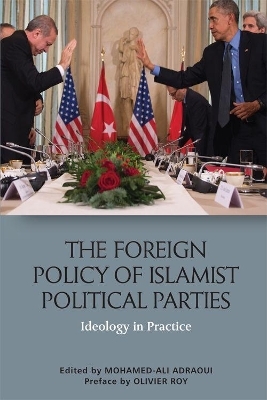
The Foreign Policy of Islamist Political Parties
Ideology in Practice
Seiten
2019
Edinburgh University Press (Verlag)
978-1-4744-2665-7 (ISBN)
Edinburgh University Press (Verlag)
978-1-4744-2665-7 (ISBN)
Drawing on a series of case studies, this collective work sheds light on six national trajectories of Islamism. Contributors look at what has been produced by the representatives of political Islam in each case, and the way these representatives have put their words and their ideological aspirations into action within their foreign policies.
Does political Islam have a specific vision of global politics? How has the foreign policy of Islamist forces developed in order to impose their ideas onto the diplomatic agenda of other countries? How do these actors perceive the world, international affairs, and the way Islamic countries should engage with the international system?
Eager to break with the dominant grammar of international relations, and instead to fuse Muslim states in a unique religious and political entity, Muslim actors have had to face up to the realities that they had promised to transform. Drawing on a series of case studies, this collective work sheds light on six national trajectories of Islamism: in Morocco (the Party of Justice and Development), Tunisia (Ennhada), Egypt (the Muslim Brotherhood), Palestine (Hamas), Lebanon (Hizbullah) and Turkey (AKP). It looks at what has been produced by the representatives of political Islam in each case, and the way these representatives have put their words and their ideological aspirations into action within their foreign policies.
Does political Islam have a specific vision of global politics? How has the foreign policy of Islamist forces developed in order to impose their ideas onto the diplomatic agenda of other countries? How do these actors perceive the world, international affairs, and the way Islamic countries should engage with the international system?
Eager to break with the dominant grammar of international relations, and instead to fuse Muslim states in a unique religious and political entity, Muslim actors have had to face up to the realities that they had promised to transform. Drawing on a series of case studies, this collective work sheds light on six national trajectories of Islamism: in Morocco (the Party of Justice and Development), Tunisia (Ennhada), Egypt (the Muslim Brotherhood), Palestine (Hamas), Lebanon (Hizbullah) and Turkey (AKP). It looks at what has been produced by the representatives of political Islam in each case, and the way these representatives have put their words and their ideological aspirations into action within their foreign policies.
Mohamed-Ali Adraoui is a Political Scientist working on contemporary International Relations. Currently a Marie Sklodowska Curie Fellow at the Georgetown University School of Foreign Service and a Visiting Scholar at the Harvard Weatherhead Center for International Affairs, his ongoing research deals with the US foreign policy towards Islamism. Prior to this he was Max Weber Fellow at the European University Institute and a Senior Fellow at the National University of Singapore.
| Erscheinungsdatum | 02.12.2019 |
|---|---|
| Vorwort | Olivier Roy |
| Verlagsort | Edinburgh |
| Sprache | englisch |
| Maße | 156 x 234 mm |
| Themenwelt | Geisteswissenschaften ► Religion / Theologie ► Islam |
| Sozialwissenschaften ► Politik / Verwaltung ► Europäische / Internationale Politik | |
| Sozialwissenschaften ► Politik / Verwaltung ► Politische Systeme | |
| Sozialwissenschaften ► Politik / Verwaltung ► Politische Theorie | |
| ISBN-10 | 1-4744-2665-4 / 1474426654 |
| ISBN-13 | 978-1-4744-2665-7 / 9781474426657 |
| Zustand | Neuware |
| Haben Sie eine Frage zum Produkt? |
Mehr entdecken
aus dem Bereich
aus dem Bereich


